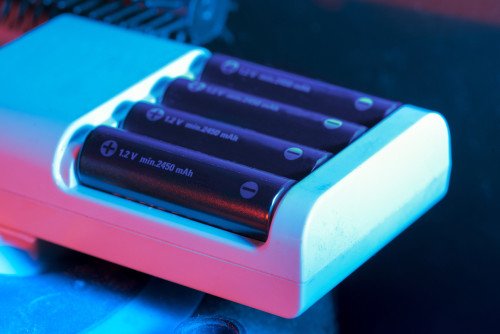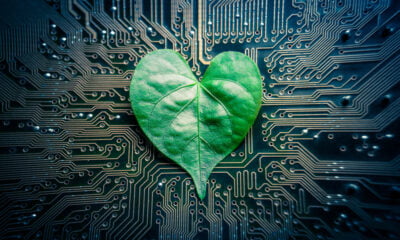

Energy
Eco-Friendly Consumer’s Guide to Choosing Rechargeable Batteries
Batteries are very important for electronic devices. Unfortunately, they also are harmful to the environment. A team of researchers from Germany and Spain published a study titled Environmental assessment of a new generation battery: The magnesium-sulfur system. This underscores some of the environmental consequences of batteries in electric vehicles, but the study can be extrapolated to focus on the problems caused by consumer batteries as well.
Buying new batteries these days can be overwhelming at times. There are plenty of leading battery brands to choose from, so you have to know which type of battery is suitable for your device.
This can be very tricky! Well, if you’re looking for a sustainable alternative to single use batteries, BuyABattery has put together this handy guide for everything you need to know about rechargeable batteries.
The 3 types of rechargeable batteries for eco-friendly consumers
Rechargeable batteries are better for the planet, but you have to purchase the right ones. When purchasing new rechargeable batteries, you will need to be aware of the three types of batteries and whether they are compatible for your device. You also have to understand the environmental impact of hte batteries you are choosing.
There are three rechargeable batteries that are known to be good for the environment. The three in question are:
- Nickel-Cadmium (NiCd)
- Nickel-Metal-Hydride (NiMH)
- Li-ion (Lithium Ion)
Eco-friendly consumers should do their due diligence to find the eco-friendliest batteries. Here is the lowdown on your options, as well as their benefits and environmental impacts.
NiCd batteries
These batteries contain nickel oxide hydroxide and metallic cadmium electrodes and are commonly used for small devices such as camcorders and portable computers. NiCd batteries are known to best perform when they are completely discharged. These batteries are becoming outdated as new technology emerges, but the main disadvantage is by far the negative environmental effect of the metals used. If you are really concerned about protecting the environment, then you will want to consider a different alternative.
Pros:
- They have a lower self discharge rate, at just 20%.
- They have a high life expectancy.
Cons:
- These batteries have a lower voltage than others.
- Having outdated technology puts these batteries at a disadvantage.
- They are not environmentally friendly.
NiMH batteries
Nickel-Metal-Hydride batteries are a great option to consider when looking for rechargeable batteries. These batteries are commonly used for laptops, cameras, and other small devices, like NiCd. They are labelled as environmentally friendly which is a big advantage compared to NiCds. Here are the pros and cons for you to consider:
Pros
- Environmentally friendly.
- They have 30% more capacity than NiCd batteries.
- These batteries are sometimes made with modern stay-charged technology so they can come precharged.
Cons:
- These batteries are known to have a high self discharge, meaning if you leave it for a while it will lose charge overtime on its own.
- They have a lower voltage than what is currently available.
Li-ion batteries
Lithium Ion batteries are mostly used for electric cars, iPhones, and portable electronics. These batteries are powerful and efficient, making them currently the most preferable choice. However, they are considerably more expensive than the other types of rechargeable batteries out there. Li-ion batteries are growing in popularity in recent years, here are the advantages and disadvantages that you should be aware of:
Pros:
- A very low self discharge rate compared to NicD and NiMH.
- They have a high voltage of 3.7.
- These batteries are lightweight and compact.
- Eco-friendly.
Cons:
- These batteries are not as sturdy as their counterparts, so they tend to be more fragile.
- Although these batteries are long-lasting, their performance declines over time.
- It is known that Li-Ion batteries are unsafe at high temperatures.
Why are rechargeable batteries a sustainable choice?
Many rechargeable batteries are made up of a percentage of recycled materials. Rechargeable batteries are a great way to reduce your carbon footprint as they save on resources by being reusable. Therefore, switching to these batteries should be part of your strategy to live an eco-friendly life.
All you need is a suitable battery charger to be able to make the most of your batteries. Also, rechargeable batteries offer an alternative to single use batteries, which are bad for the environment when discarded. When it comes to batteries, switching to rechargeable batteries is the sustainable way forward.


 Environment12 months ago
Environment12 months agoAre Polymer Banknotes: an Eco-Friendly Trend or a Groundswell?

 Features11 months ago
Features11 months agoEco-Friendly Cryptocurrencies: Sustainable Investment Choices

 Features12 months ago
Features12 months agoEco-Friendly Crypto Traders Must Find the Right Exchange

 Energy11 months ago
Energy11 months agoThe Growing Role of Solar Panels in Ireland’s Energy Future




























